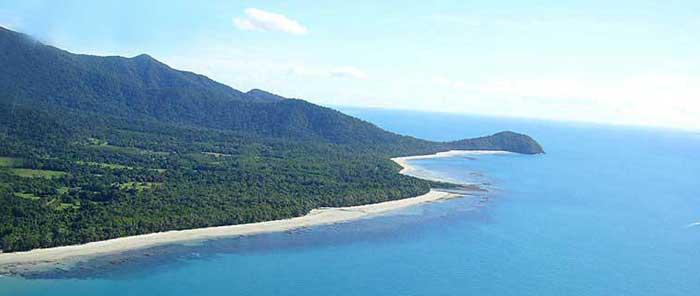 Accommodation | International
Flights | Domestic
Flights | Tours
| Travel
Insurance | Car
Hire | Visas
| Shopping
| Dating
| Humour
Accommodation | International
Flights | Domestic
Flights | Tours
| Travel
Insurance | Car
Hire | Visas
| Shopping
| Dating
| Humour2012 TOTAL SOLAR ECLIPSE IN AUSTRALIA
The moon will totally obscure the sun during the 2012 Solar Eclipse in North Queensland
The 2012 Solar Eclipse was a partial solar eclipse visible in Norfolk
Island, New Zealand and parts of Chile, but there was only one place in
the world where it will be visible on land as a Total Solar Eclipse with
two minutes of darkness and that is Far North Queensland in Australia
where the shadow of the sun swept across Cape York and the Great Barrier
Reef and then moved across unpopulated areas of the Pacific Ocean.
A total eclipse occurs when the sun is completely obscured by the moon
and this is visible only on a narrow path on the surface of the earth.
This amazing event occured at 6:38am (local Queensland time) on the morning
of 14 November when the sun completely obscured the moon leaving an area
of only 150km wide in total darkness except for an awe inspiring electric
corona silhouettng the moon.
A partial eclipse can be viewed for several thousand kilometres but the
total darkness was only visible to a lucky few on the coast of the Daintree
National Park and down the coast in places such as Port Douglas and Cairns.
Tens of thousands of observers flew in from around the world and gathered
in the area from Cairns to Cape Tribulation to witness one of the world's
most unique events.

The strip of land that plunged in to darkness during the 2012 solar eclipse.
Cape Tribulation in the Daintree National Park was one of the best places
to witness and experience this spectacle.
This is the place where the ancient rainforests run right down to the
beaches of the Great Barrier Reef Marine Park, and here you can get away
from the crowds, find a quiet remote beach and while viewing the solar
eclipse over the ocean you will hear the singing of birds in the rainforest
behind you go eerie quiet as darkness sets in.

What better place to watch the solar eclipse, hear the birds go quiet
in the rainforest behind you while viewing the eclipse over the ocean
Here is a report from our webmaster who was in Cape Tribulation to view this spectacle, he spent the night before the eclipse at Rainforest Hideaway B&B which is only a 20 minute walk to Myall Beach.

On my way to the beach I felt a few drops of rain, which worried me a
bit. Weather forecasters the day before had not been optimistic about
the weather conditions for this morning.
I arrived on Myall Beach even before the sun had risen above the horizon,
and much to my delight I only saw a few clouds and plenty of clear sky.
It is now about 05:30.

The sun is creeping over the horizon in preparation for the big show.

The sun has risen and the sky is mostly clear, time around 05:40 now.

A photo taken through the special eclipse viewing glasses, the moon can be seen starting to move across the sun in the top left corner. It is now just before 06:00.

The moon has now moved a bit further in front of the sun.

The moon has now covered most of the sun. The above photo was taken through the eclipse viewing glasses, but amazingly enough the sun is still that strong that if you were to arrive at the beach without having had any news on this event then you would probably not even notice that anything was different, and something awesome was about to happen. The sun still appears to be full and normal to the naked eye, even when you can see through your eclipse glasses that is is more than half covered.

The moon is now totally covering the sun and a sudden darkness has descended over us, Venus becomes visible above the sun.

These photos were taken while darkness descended over us.
If you want to see another solar eclipse in Australia then there is an annular solar eclipse on 10 May 2013 over Cape York a bit north of Cape Tribuation, but for a total solar eclipse where all goes dark you will have to wait until 2026 when Sydney gets treated to this spectacle.
How to view aneclipse safely?
The only time that it is safe to view the eclipse without any filters or protection is when the sun is totally eclipsed, but safety precautions must be taken before and after this phase. Never look directly at the sun with the naked eye or especially not through an optical device such as binoculars or a telescope as it can cause severe permanent eye damage. Because the retina senses no pain you do not realize that you are damaging your eyes, until it is too late. Inspect solar eclipse glasses for damage, scratches can render them useless and do more harm than good by wearing them.
HOME PAGE
Tourist Information
General Information
And Entertainment
ACCOMMODATION IN AUSTRALIA
Bed
& Breakfast
Budget
Accommodation
Backpackers Hostels
Hotels
in Australia
CAR HIRE IN AUSTRALIA
Australia Rental Cars
And
Campervans

TOURS
IN AUSTRALIA
What To Do In Australia
On-line
Shopping
On-line
Dating
![]()
About
Australia
Visas For Australia
How
To Get To Australia
How To Get Around
Travel Insurance
Travel Guides
Working
In Australia
Australian
Posters
Survival
Tips
Weather,
When To Go

Use of
this website constitutes acceptance of the User Agreement for this website
Contact us |
Advertise on this site
| Link to this site |Add
your photos or stories to this site |
Webmasters | Affiliates
